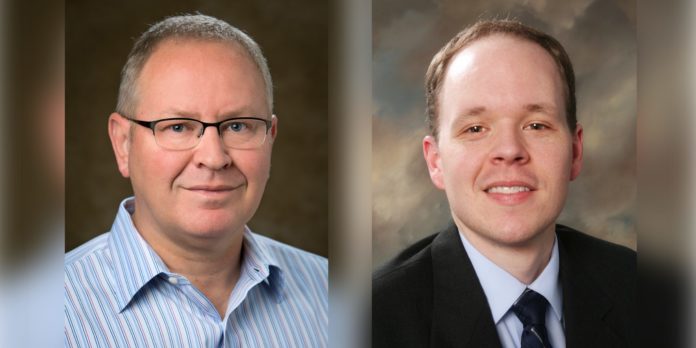MACON – Dr. Jean R. Sumner, dean of Mercer University School of Medicine (MUSM), recently announced the appointments of Dr. Brad Lian (pictured left) and Dr. Jacob Warren (pictured right) as vice-chairs in the Department of Community Medicine.
“Dr. Lian has done a superb job of leading the Department of Community Medicine as interim chair, and he will continue to serve the University and the School of Medicine extremely well in his role as vice-chair for academics. He is a respected researcher, a valued colleague and a team player. We are very pleased that he was willing to accept this role,” said Dr. Sumner.
“Dr. Warren will serve as vice-chair for research. He is an accomplished, nationally known researcher in areas of public health and mental health, and we are delighted he was willing to accept this role,” she added.
Dr. Lian’s research interests revolve around poverty, adolescent development and community assessment. He has extensive experience with large-scale, community-based projects and has a research background in quantitative methods, design and field research.
Before joining MUSM in 2012, he held positions as a research scientist and assistant professor at the University of Alabama at Birmingham and the University of Alabama at Tuscaloosa, where he co-directed the Mobile Youth Survey of low-income adolescents from 2001-2011 involving approximately 25 sites and 3,000 adolescents each summer, was lead evaluator for a HRSA-funded Healthy Start Program, and was an investigator or co-principal investigator on several Centers for Disease Control and other federally-funded research projects totaling more than $10 million.
Dr. Warren is a behavioral epidemiologist and serves as Rufus C. Harris Endowed Chair and director of the Center for Rural Health and Health Disparities, an NIH Center of Excellence housed within the School of Medicine.
He specializes in the development of innovative approaches to improve health status and health outcomes in health disparity populations, with a particular focus on rural residents. He has published two books on rural health issues and more than 50 peer-reviewed journal articles and book chapters, and has received more than $10 million in grants to support his research.
Dr. Warren is a section councilor for the Medical Care Section of the American Public Health Association, a health equity ambassador for the American Psychological Association, chair of Georgia’s Farmworker Health Program Governing Board, and was named the 2016 Researcher of the Year by the National Rural Health Association.
About Mercer University School of Medicine (Macon, Savannah and Columbus)
Mercer University’s School of Medicine was established in 1982 to educate physicians and health professionals to meet the primary care and healthcare needs of rural and medically underserved areas of Georgia. Today, more than 60 percent of graduates currently practice in the state of Georgia, and of those, more than 80 percent are practicing in rural or medically underserved areas of Georgia. Mercer medical students benefit from a problem-based medical education program that provides early patient care experiences. Such an academic environment fosters the early development of clinical problem-solving and instills in each student an awareness of the place of the basic medical sciences in medical practice. The School opened a full four-year campus in Savannah in 2008 at Memorial University Medical Center. In 2012, the School began offering clinical education for third- and fourth-year medical students in Columbus. Following their second year, students participate in core clinical clerkships at the School’s primary teaching hospitals: Medical Center, Navicent Health in Macon; Memorial University Medical Center in Savannah; and The Medical Center and St. Francis Hospital in Columbus. The School also offers master’s degrees in family therapy, preclinical sciences and biomedical sciences.










